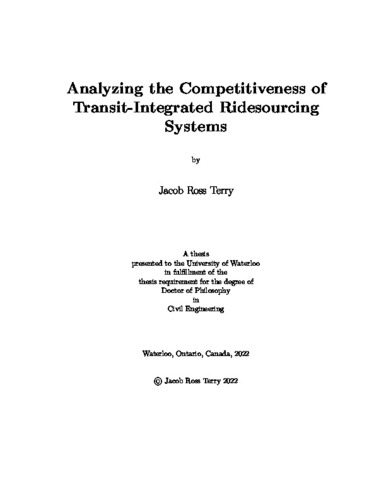| dc.contributor.author | Terry, Jacob Ross | |
| dc.date.accessioned | 2022-12-20 21:40:42 (GMT) | |
| dc.date.available | 2022-12-20 21:40:42 (GMT) | |
| dc.date.issued | 2022-12-20 | |
| dc.date.submitted | 2022-11-25 | |
| dc.identifier.uri | http://hdl.handle.net/10012/18977 | |
| dc.description.abstract | Ridesourcing platforms operated by transportation network companies are becoming increasingly popular. Municipal transit agencies have rapidly launched integrated systems with ridesourcing vehicles to extend the reach of their fixed-route transit networks and as a response to changes in the transportation system. These integrated systems have not been critically evaluated, and agencies are implementing ridesourcing systems without much precedence or guidance concerning the integration of transit and ridesourcing. Past research on demand-responsive transport assumed the majority of trips were booked a day or more in advance using subscriptions. This research considers how ridership may change due to the immediacy and convenience of app-based booking for on-demand transit.
The objective of this research is to determine the spatial characteristics of transit-integrated ridesourcing networks that best support and encourage use of the greater transit network. A series of spatial attributes were identified based on literature and existing systems, which formed the basis of the research. A recent transit-integrated ridesourcing pilot in Waterloo, Ontario was evaluated for competitiveness with other alternatives and to observe changes in spatial and temporal characteristics. Through this evaluation, a trip typology was developed that other transit agencies can use to evaluate the spatial competitiveness of their transit-integrated ridesourcing systems. The findings of the evaluation indicate that the trips taken in the pilot were mostly complementary to transit, and that the pilot was both growing in weekly ridership and trending towards trips that do not compete with fixed-route transit.
A revealed-preference/stated-preference survey was conducted in the same geographical area as the former pilot to determine the combinations of spatial attributes that would best entice residents. 230 responses were gathered from the survey. Qualitative questions from the survey revealed that COVID-19 was not perceived as a deterrent for fixed-route transit or transit-integrated ridesourcing, that car ownership and bicycle ownership correlated with the respective likelihood of driving or cycling, and that fare card or pass ownership did not correlate with the likelihood of taking transit. The lack of familiarity among respondents with the pilot that had previously operated in the area indicates that poor advertising of the service may have been a contributor to ridership not meeting agency targets.
A non-linear Bayesian mixed logit model was estimated using the stated-preference portion of the survey, using 2990 best and worst observations (13 scenarios from each of the 230 respondents). The model was applied to a series of representative trips through scenario analysis to determine how mode share would change under various combinations of spatial and operational characteristics. Respondents were found to have similar perceptions of transit-integrated ridesourcing and fixed-route transit. For time attributes (e.g., total, wait, walk), respondents showed the highest sensitivity in the 5-10 minute range. Adjusting the demand patterns of the transit-integrated ridesourcing service to be more permissive of different origin-destination pairs considerably increased the expected mode share for transit-integrated ridesourcing, but may require caution due to the negative impacts in some scenarios for fixed-route transit. The largest shifts in mode share came from directly charging for parking, where the mode share for auto dropped from over 90% to under 50% in most cases. | en |
| dc.language.iso | en | en |
| dc.publisher | University of Waterloo | en |
| dc.relation.uri | https://doi.org/10.5683/SP3/MARSLQ | en |
| dc.subject | demand-responsive transport | en |
| dc.subject | public transit | en |
| dc.subject | ridesourcing | en |
| dc.subject | mode choice | en |
| dc.subject | revealed-preference | en |
| dc.subject | stated-preference | en |
| dc.subject | household surveys | en |
| dc.subject | on-demand transit | en |
| dc.title | Analyzing the Competitiveness of Transit-Integrated Ridesourcing Systems | en |
| dc.type | Doctoral Thesis | en |
| dc.pending | false | |
| uws-etd.degree.department | Civil and Environmental Engineering | en |
| uws-etd.degree.discipline | Civil Engineering | en |
| uws-etd.degree.grantor | University of Waterloo | en |
| uws-etd.degree | Doctor of Philosophy | en |
| uws-etd.embargo.terms | 0 | en |
| uws.contributor.advisor | Bachmann, Chris | |
| uws.contributor.affiliation1 | Faculty of Engineering | en |
| uws.published.city | Waterloo | en |
| uws.published.country | Canada | en |
| uws.published.province | Ontario | en |
| uws.typeOfResource | Text | en |
| uws.peerReviewStatus | Unreviewed | en |
| uws.scholarLevel | Graduate | en |

